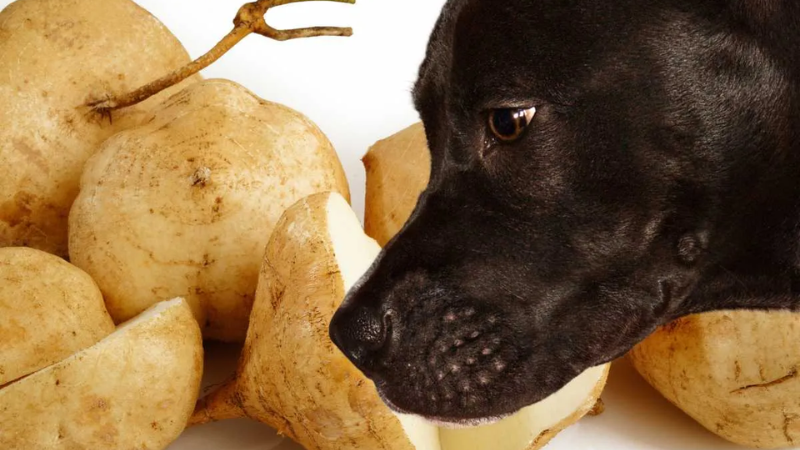Uncovering the Truth: Can Our Furry Friends Enjoy the Delightful Taste of Jicama?
Jicama is a root vegetable native to Mexico and Central America that can be a great addition to any pup's diet. It is high in dietary fiber, vitamins, minerals, prebiotic fiber, and low in calories and fat. It also helps keep your pup hydrated due to its high water content and has anti-inflammatory properties that can help reduce inflammation in their joints and muscles. Jicama is safe for dogs to eat as long as you check with your vet first to ensure they don't have any allergies or sensitivities. It can be given as raw sticks as treats or added into meals.
Can Dogs Have Jicama?
Jicama is a root vegetable that is native to Mexico and Central America. It is also known as the Mexican turnip, Mexican yam bean, or jícama de agua. The plant has an edible tuberous root and small stems and leaves. Many pet owners wonder if jicama is safe for their furry friends, so let’s take a look at the benefits of this vegetable for dogs.

What Are the Benefits of Jicama for Dogs?
Jicama has many potential benefits for your pup. For starters, it’s high in dietary fiber which helps support a healthy digestive system. It’s also rich in vitamin C, potassium, and beta carotene which are all essential nutrients for your pup's health. Additionally, jicama contains prebiotic fiber which helps feed good bacteria in the gut. Another great benefit of jicama is that it’s low in calories and fat making it a great snack for dogs who need to watch their weight. Plus, it can help keep your dog hydrated due to its high water content. Finally, this root vegetable has anti-inflammatory properties that can help reduce inflammation in your pup's joints and muscles.
How Can You Feed Your Dog Jicama?
The easiest way to feed your dog jicama is by giving them jicama sticks as treats! Simply cut up some raw jicama into small pieces and offer them as snacks throughout the day. You can also add chopped up pieces of jicama to your pup's food or make homemade dog treats with mashed up jicama as an ingredient!
Is Jicama Toxic To Dogs?
No, jicama is not toxic to dogs so you don't have to worry about feeding it to them! However, you should always check with your vet before introducing any new food into your pup's diet just to be sure they don't have any allergies or sensitivities that could be triggered by the new food item.
Conclusion
Jicama is a great addition to any pup's diet! It has many potential health benefits including being high in dietary fiber, being rich in essential vitamins and minerals, containing prebiotic fiber that helps feed good bacteria in the gut, being low in calories and fat making it a great snack option for dogs who need to watch their weight, helping keep your pup hydrated due to its high water content, and having anti-inflammatory properties that can help reduce inflammation in their joints and muscles. Plus it’s easy to feed your pup jicama - simply give them some raw sticks as treats or add chopped pieces of the root vegetable into their meals! Just make sure you always check with your vet before introducing any new food into their diet just to be sure they don't have any allergies or sensitivities that could be triggered by the new food item."
Related Article: Can I Use Neosporin on My Dog?
Ferquently Asked Questions
Can dog eat cooked jicama?
Jicama can be served raw or cooked but it is best to feed it cooked to avoid digestive issues in your dog. The skins of the bulbs can be slightly toxic so be sure to peel them before cooking.
What vegetables are not toxic to dogs?
Small pieces of dog-safe vegetables, such as pumpkin, carrots, green beans, sweet potatoes, broccoli, or cauliflower make delicious and healthy treats for puppies, as long as they are cooked, finely cut, and served plain.
What are the side effects of eating jicama?
Side-Effects & Allergies of Jicama Jicama contains huge fiber content and so excessive consumption leads to digestive disorders like constipation and stomach ache. It is not advisable for people to eat the outer peels of jicama as it contains a highly toxic compound.Dec 9, 2022
Is Singkamas safe for dogs?
The stems and leaves contain a toxin called rotenone, which is a natural compound that acts as an insecticide and is toxic to humans, dogs, and other animals. The seeds of the jicama are not typically dangerous when young, but mature seeds are toxic and can be a choking hazard for dogs.Feb 7, 2023
What is the toxin in jicama?
While its root benefits are plain to see, travel above ground and the jicama plant turns toxic, churning out seeds containing the poison rotenone. While this substance can be lethal to humans in large quantities, it's most dangerous to bugs and fish and is used as an insecticide and piscicide.Apr 27, 2011
What do we call jicama in English?
Jicama is sometimes known as the Mexican turnip or Mexican potato.

